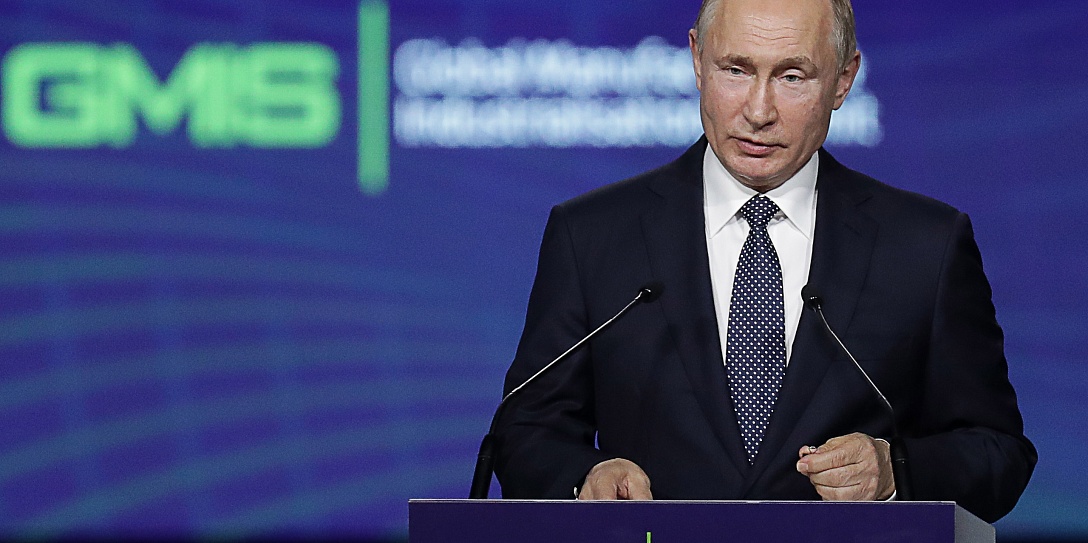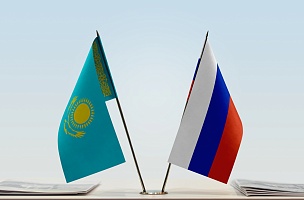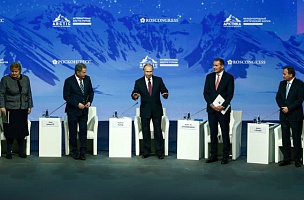Ladies and Gentlemen, Friends,
I would like to welcome you to Yekaterinburg, one of Russia’s biggest historical centres of science, education and industry, to the Global Manufacturing and Industrialisation Summit.
For the second time running, this Summit has brought together officials, business, science and NGO representatives fr om almost all over the world. In effect, it has already made a serious claim to becoming a much-in-demand international platform for thorough discussions on challenges of the new technological era.
I would like to use this rostrum to thank you for the invitation and to describe once again Russia’s approaches to resolving common, fundamental, without any exaggeration, civilizational problems.
I would like to speak about our vision of the long-term trends determining global development and the risks we are already facing or might face very soon.
Yes, it is obvious today that the increasingly rapid transformation is radically changing the appearance of entire regions, industries, production techniques and business models.
Systems of AI, 3D-printing, and other developments are exerting a tremendous influence on the efficiency of management and labour productivity.
It would seem there is a new industry here without pipes and rubbish heaps, a post-industrial society free of environmental risks, about which 20th century futurologists dreamed.
Yet the hopes that new technology as such will save the world fr om the growing anthropogenic influence and burden largely have proven to be an illusion.
The degradation of nature and the climate continues and is manifested more and more in droughts, crop failures and natural calamities.
Incidentally, we in Russia are the hardest hit. As I recently said, the temperature in Russia is growing 2.5 times faster than the average in other parts of the world.
Just look at what is happening now in the Irkutsk Region: huge fires, hundreds of hectares of forest are burning, and terrible floods.
If nothing is done, rapid technological development will exacerbate rather than alleviate all our environmental challenges, including climate change and resource depletion.
According to the forecasts, the billions of communication devices and the rapidly growing infrastructure for storing, processing and transferring Big Data will consume over 30% of the world’s electricity by the middle of the next decade. How can we achieve this huge amount of generating capacity? There is no clear-cut answer to this question.
That said, building up generating capacity and increasing energy consumption as we have been is bound to engender new risks and further climate change. Even now, the energy industry accounts for a quarter of all CO2 emissions into the atmosphere. The other major hothouse emitters are agriculture, heavy industry and transport.
It is not yet clear how to combine long-term development and production build-up with preserving nature and high living standards. How do we prevent the digital technological revolution, robotisation and the general move toward the Internet of Things from ending in a deadlock without resources and with environmental damage?
We believe these issues require a detailed, meaningful discussion. Regrettably, though, instead of discussing the essence of the climate and environment agenda, we often see overt populism, false allegations and, I dare say, obscurantism.
It comes down to appeals to give up progress, which will make it possible at best to perpetuate the situation and create local wellbeing for a sel ect few. At the same time, millions of people will have to settle for what they have today or, it would be more appropriate to say, what they do not have today: access to clean water, food, education and other basics of civilisation.
Naturally, such outdated approaches are a road to nowhere. They can only lead to new conflicts. A derivative of this approach or one of them, at any rate, is the migration crisis in Europe, and the US as well, for that matter.
Absolutist, blind faith in simple, showy but ineffective solutions can lead to problems. I mean such approaches as total rejection of nuclear or hydrocarbon energy, for example, going for existing alternative energy sources alone.
Will it be comfortable to live on a planet covered in wind turbines and solar batteries? As they say, it’s like sweeping the rubbish under the rug instead of cleaning the house.
Everybody knows that wind power is good but is anyone thinking about the birds? How many birds die? The turbines shake the ground so much that the worms crawl out. This is not a joke, really, it is a serious side-effect of these modern modes of energy generation. I am not saying it should not be developed — of course it should; but let’s not forget the related problems.
Of course you can’t forbid anyone fr om wearing animal fur or living in caves, but it is impossible and pointless to try and stop human progress. The question is, what is the base this progress can be built on realistically to achieve the millennium development goals set by the United Nations.
I believe that, in order to ensure cleaner air, water and food, which also means a better quality of life and greater longevity for the billions of people on our planet, we must offer up radically new technologies and more efficient and environmentally-friendly devices.
Such super-efficient scientific, engineering and manufacturing solutions will help us establish a balance between the biosphere and the technosphere, as well as to minimise and better control the anthropogenic impact on nature, on the environment.
This also includes so-called nature-like technologies that reproduce natural processes and systems according to the laws of nature.
It may seem strange at first but fusion energy, which is, in fact, similar to how heat and light are produced in our star, in the Sun, is an example of such nature-like technologies.
Potentially, we can harness a colossal, inexhaustible and safe source of energy. Yet we will only succeed in fusion energy and in fulfilling other fundamental tasks if we establish broad international cooperation and interaction between government and business and combine the efforts of researchers representing different scientific schools and areas. If technological development becomes truly global, it will not be split up or reined in by attempts to monopolise progress, lim it access to education and put up new obstacles to free exchange of knowledge and ideas.
By the way, the International Thermonuclear Experimental Reactor (ITER) serves as a prime example of open scientific, technological cooperation. Scientists are now planning to use it to launch controlled thermonuclear fusion.
Our country is actively participating in this project and is now prepared to suggest that they use Russia’s scientific infrastructure for joint research, joint scientific investigation, for the international scientific teams that are working in the sphere of nature-like and other breakthrough technologies, including unique mega-science installations.
With their help, scientists will be able literally to see nature’s creation processes. I would like to note that this installation has become an essential part of the interdisciplinary centre for nature-like convergent technologies that has been in operation at one of Russia’s biggest scientific centres, the Kurchatov Institute, for over a decade.
We launched the world’s most powerful neutron generator, called the PIK reactor complex, near St Petersburg. It serves as the base for the future international neutron research centre. We also started designing a unique fourth-generation source of synchrotron radiation in Novosibirsk and are now planning to construct and modernise mega-science installations in Vladivostok and Protvino in the Moscow Region.
For the sake of international research teams who want to work in Russia, for the sake of hosting large-scale interdisciplinary projects and establishing international scientific clusters, we intend to come up with the most comfortable conditions and support mechanisms.
Russia is now initiating major scientific and technological programmes with great potential for environmental and ecological sustainability. These include areas like artificial intelligence, new materials, genome technology, clean agricultural solutions, portable energy sources and energy transfer and storage.
To accomplish these goals, we intend to use the potential of our major, partially government-owned companies. By the way, as you may know, I recently visited Italy and spoke to our partners; our colleagues there use partially government-owned enterprises. It might seem strange, but we are going in the same direction — first, because this is an international task, and second, we have state resources that we can use in key development areas.
As I have said, to achieve this we will use partially government-owned companies and, of course, we expect to partner with private businesses and so called «techpreneurs.» It is crucially important to create an effective legislative and regulatory environment for them.
Of course, we are aware that today, this is definitely an issue for us that, sadly, cannot be resolved quickly. We would like to do so more quickly but it is very important to avoid any incautious steps that might have unexpected consequences.
The Government has already been tasked with offering an effective mechanism for prompt adoption of regulatory and legislative solutions in the technological area. In general, we will continue making consistent efforts to improve the business and investment climate in Russia. Such freedom in creating initiatives is a key condition for society and the nation’s success in this ever-changing world.
Friends, Ladies and Gentlemen,
We have to find comprehensive responses to the problems we are facing. This includes a guarantee of sustainable development. I believe that, in this era of tectonic changes and, unfortunately, increasing uncertainty, absolute values — that is, creating better living conditions and opportunities for unleashing human potential — must be a priority.
Impressive technological development should serve this purpose. This is wh ere we bear great responsibility for the future of our nation and the world in general — and we definitely must work together.
Friends,
Russia is open to this kind of expansive and equitable cooperation.
I wish you success. Thank you for your attention.
Source: http://en.kremlin.ru






